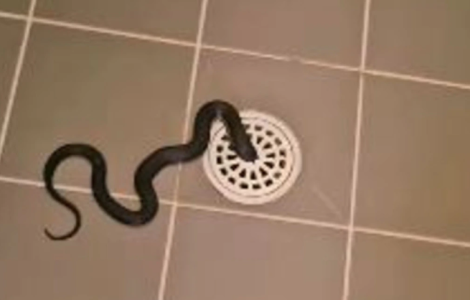Unexpected encounters trigger sudden surge in hospitalisations: 'Leave it alone'
By
- Replies 14
As the sun beats down and the mercury rises, Australians know that summer isn't just about beach days and barbecues.
It's also the season when some of the country's less cuddly inhabitants become particularly active.
This has been made abundantly clear in Queensland as a recent spike in snake encounters has left several individuals needing urgent medical care.
In a startling reminder of the risks posed by Australia's diverse and often venomous snake population, seven Queenslanders found themselves in hospital after suffering snake bites in a single weekend.
This surge in incidents has prompted health officials and wildlife experts to warn residents and visitors alike: be vigilant and avoid snakes at all costs.
The weekend's alarming tally is part of a broader trend that has seen a significant increase in snake bite reports across the state.
In the week leading up to 10 February, Queensland Ambulance responded to 24 snake bite cases, with hotspots including the Gold Coast, Cairns and Hinterland, and Darling Downs.
The numbers are a sharp rise from the previous months, with 88 reports in November 2024, jumping to 129 in December, and holding steady at 128 in January 2025.
One particularly distressing case involved a man in his 30s who was bitten on the ankle at a property in Morayfield, north of Brisbane.
The incident, which occurred on a Sunday afternoon, left him in a potentially life-threatening condition and necessitated a rapid response from paramedics who rushed him to Caboolture Hospital.
The Rockhampton area has also seen a notable increase in hospital admissions due to snake bites, with The Courier Mail reporting a busy period between November last year and January 2025.
Tragically, the dangers of snake encounters were underscored by the death of 16-year-old Beau Horan, who succumbed to a snake bite in Wurdong Heights last November.
David Voss, a local snake catcher, described the season as 'busy' and noted that snake activity had kicked off earlier than usual, likely due to the warm winter experienced last year.
'Snakes are very seasonal, so obviously, during the warmer months, there’s a lot more activity,' Mr Voss explained.
Joseph O’Donnell, acting operations supervisor for Queensland Ambulance Service Rockhampton, emphasised the importance of avoiding snakes.
'If you see a snake, leave it alone,' he advised, adding that all snake bites should be treated as potentially venomous.
The symptoms of a snake bite can vary widely, from vomiting and diarrhea to severe pain at the bite site.
Some victims may not even realise they've been bitten, as marks are not always visible, and sensations can be delayed.
Queensland Health's website stresses the urgency of acting quickly in the event of a snake bite, advising against panic, running, or attempting to capture the snake.
Instead, the victim should move to a safe place and remain still, avoiding any actions that could spread the venom, such as washing, sucking, or cutting the bite site.
In case of a snake bite, calling Triple Zero is crucial. The recommended response depends on the location of the bite, with the general advice being to lie the person down to prevent movement until medical help arrives.
Detailed instructions for treating bites based on location can be found on the Queensland Health website.
For our readers, you must be aware of the increased snake activity during the summer months.
Always watch your surroundings, particularly when enjoying outdoor activities or tending to your garden.
If you plan to venture into areas where snakes may be present, wear protective clothing and sturdy boots.
In other news, a South Australian man faced a 15-hour delayed reaction to a suspected brown snake bite.
Clinical toxicologist Geoffrey Isbister advised never to assume a snake bite is venomless, as the effects of envenoming typically become noticeable within six hours. You can read more about it here.
Credit: YouTube

Have you or someone you know had a close encounter with a snake? Share your experiences and tips for staying safe in the comments below. Let's help each other stay informed and protected during snake season.
It's also the season when some of the country's less cuddly inhabitants become particularly active.
This has been made abundantly clear in Queensland as a recent spike in snake encounters has left several individuals needing urgent medical care.
In a startling reminder of the risks posed by Australia's diverse and often venomous snake population, seven Queenslanders found themselves in hospital after suffering snake bites in a single weekend.
This surge in incidents has prompted health officials and wildlife experts to warn residents and visitors alike: be vigilant and avoid snakes at all costs.
The weekend's alarming tally is part of a broader trend that has seen a significant increase in snake bite reports across the state.
In the week leading up to 10 February, Queensland Ambulance responded to 24 snake bite cases, with hotspots including the Gold Coast, Cairns and Hinterland, and Darling Downs.
The numbers are a sharp rise from the previous months, with 88 reports in November 2024, jumping to 129 in December, and holding steady at 128 in January 2025.
One particularly distressing case involved a man in his 30s who was bitten on the ankle at a property in Morayfield, north of Brisbane.
The incident, which occurred on a Sunday afternoon, left him in a potentially life-threatening condition and necessitated a rapid response from paramedics who rushed him to Caboolture Hospital.
The Rockhampton area has also seen a notable increase in hospital admissions due to snake bites, with The Courier Mail reporting a busy period between November last year and January 2025.
Tragically, the dangers of snake encounters were underscored by the death of 16-year-old Beau Horan, who succumbed to a snake bite in Wurdong Heights last November.
David Voss, a local snake catcher, described the season as 'busy' and noted that snake activity had kicked off earlier than usual, likely due to the warm winter experienced last year.
'Snakes are very seasonal, so obviously, during the warmer months, there’s a lot more activity,' Mr Voss explained.
Joseph O’Donnell, acting operations supervisor for Queensland Ambulance Service Rockhampton, emphasised the importance of avoiding snakes.
'If you see a snake, leave it alone,' he advised, adding that all snake bites should be treated as potentially venomous.
The symptoms of a snake bite can vary widely, from vomiting and diarrhea to severe pain at the bite site.
Some victims may not even realise they've been bitten, as marks are not always visible, and sensations can be delayed.
Queensland Health's website stresses the urgency of acting quickly in the event of a snake bite, advising against panic, running, or attempting to capture the snake.
Instead, the victim should move to a safe place and remain still, avoiding any actions that could spread the venom, such as washing, sucking, or cutting the bite site.
In case of a snake bite, calling Triple Zero is crucial. The recommended response depends on the location of the bite, with the general advice being to lie the person down to prevent movement until medical help arrives.
Detailed instructions for treating bites based on location can be found on the Queensland Health website.
For our readers, you must be aware of the increased snake activity during the summer months.
Always watch your surroundings, particularly when enjoying outdoor activities or tending to your garden.
If you plan to venture into areas where snakes may be present, wear protective clothing and sturdy boots.
Clinical toxicologist Geoffrey Isbister advised never to assume a snake bite is venomless, as the effects of envenoming typically become noticeable within six hours. You can read more about it here.
Credit: YouTube
Key Takeaways
- Queensland has experienced a significant number of snake bites, with seven people hospitalised in one weekend.
- There has been a surge in reports of snake bites, with 24 incidents in one week leading up to February 10.
- Authorities and snake experts have warned the public to avoid snakes and assume every bite is venomous.
- Queensland Health advises not to panic or try to catch the snake if bitten but to stay still. It also guides people on their website on how to treat snake bites.









